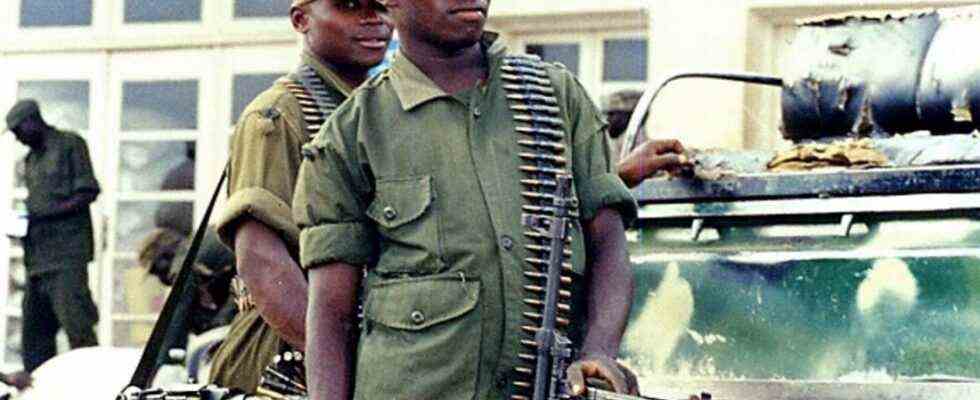The Democratic Republic of the Congo had demanded eleven billion dollars in war reparations from neighboring Uganda. The state had therefore gone before the highest UN court and longed for a decision for a long time. It fell on Wednesday afternoon, Judge Joan Donoghue announced the verdict in this compensation case in The Hague, which is likely to attract greater attention not only in Africa. The sums set by the International Court of Justice (ICJ) fell far short of Kinshasa’s expectations, although the court clearly stated that Uganda was responsible for much of the destruction: Kampala now has to pay 325 million US dollars in compensation to the neighboring country.
The ICJ saw evidence that the East African country, which sent its own troops to the embattled province of Ituri during the Congo War two decades ago and thus became an occupying power, was responsible for the loss of thousands of lives, damage to property and the Plundering of gold, diamonds and other valuable commodities. However, the court also emphasized that these compensations were not “punitive” in nature, but “compensatory”. In other words, the judges did not examine the criminal dimension of alleged war crimes that have been happening in Congo for decades. The decision of the ICJ was broadcast live.
The UN Supreme Court, whose job it is to settle disputes between states, came to the conclusion in 2005 that Uganda had violated international law when it occupied parts of the Congo with troops and armed allied militias. According to the will of the court, both countries should negotiate a compensation amount themselves. But when those attempts failed, Congo appealed to the UN court again in 2015. However, while Congo demanded that Uganda pay reparations for the deaths of 180,000 civilians, the court came to a different conclusion: Ugandan reparations should only be claimed for 10,000 to 15,000 deaths.
From 1998 to 2003, the so-called Second Congo War raged in the province of Ituri. Numerous militias terrorized the resource-rich regions on the border with Uganda and Rwanda, while rival warlords promised the population protection or brutally demanded allegiance. They pursued opponents mercilessly. There were numerous massacres and the displacement of hundreds of thousands of Congolese.
The main trigger for the destabilization of eastern Congo was initially the genocide of Tutsis and moderate Hutus in Rwanda in 1994. Radical Hutu militias then fled to the neighboring country and formed up as a military force, especially in the Kivu provinces, which is why the Rwandan army intervened at times .
There are huge gold deposits in the Frontier Province
Further north, in Ituri, the Ugandan army dominated for a number of years, during which time ethnic tensions between two ethnic groups, the Hema and the Lendu, escalated. Ugandan troops were accused of deliberately fomenting conflicts in order to plunder raw materials in the shadow of the war. The gold deposits in Ituri are among the largest deposits in Africa.
Uganda denied such accusations and justified the intervention with the need to protect its borders and fight hostile militias, a similar argument was made by Rwanda at the time. Up to nine countries were at times involved in the war in Congo.
UN investigators found that Uganda exported at least $60 million worth of gold in 2004 alone, but only mined $9 million worth of gold domestically. It is suspected that other lucrative raw material deals were also being carried out in secret. Uganda also benefited from smuggling valuable tropical timber across the border.
Even under the corrupt dictator Mobutu, state control over Ituri was low; later it collapsed completely, and rival military actors filled the vacuum. A large peacekeeping force always seemed overwhelmed and failed to prevent the massacre of defenseless civilians.
Again Ugandan soldiers are in the country
The ICJ ruling comes at a time when Ugandan troops have crossed the border again, but this time they are fighting alongside Congolese government forces in a joint offensive hunting down fighters from a group called Allied Democratic Forces (ADF ) names. Allegedly, at least parts of the militia have allied themselves with the IS.
The ADF is blamed for two suicide bombings in Uganda’s capital Kampala in November that killed four and injured dozens. According to the latest UN findings, ADF militias murdered at least 1,200 people in Congo in 2021, but it remains unclear whether and to what extent they are controlled by IS.
Congo President Felix Tshisekedi knows how sensitive his country is to foreign troops. He assured that this time the Ugandan soldiers will only remain in the country until the anti-terrorist operation is over. When this will be, however, he left open.

